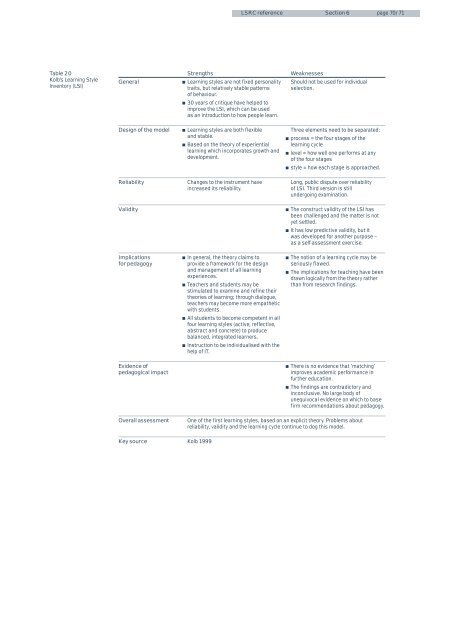learning-styles
learning-styles
learning-styles
Create successful ePaper yourself
Turn your PDF publications into a flip-book with our unique Google optimized e-Paper software.
LSRC reference Section 6<br />
page 70/71<br />
Table 20<br />
Kolb’s Learning Style<br />
Inventory (LSI)<br />
General<br />
Strengths<br />
Learning <strong>styles</strong> are not fixed personality<br />
traits, but relatively stable patterns<br />
of behaviour.<br />
30 years of critique have helped to<br />
improve the LSI, which can be used<br />
as an introduction to how people learn.<br />
Weaknesses<br />
Should not be used for individual<br />
selection.<br />
Design of the model<br />
Learning <strong>styles</strong> are both flexible<br />
and stable.<br />
Based on the theory of experiential<br />
<strong>learning</strong> which incorporates growth and<br />
development.<br />
Three elements need to be separated:<br />
process = the four stages of the<br />
<strong>learning</strong> cycle<br />
level = how well one performs at any<br />
of the four stages<br />
style = how each stage is approached.<br />
Reliability<br />
Changes to the instrument have<br />
increased its reliability.<br />
Long, public dispute over reliability<br />
of LSI. Third version is still<br />
undergoing examination.<br />
Validity<br />
The construct validity of the LSI has<br />
been challenged and the matter is not<br />
yet settled.<br />
It has low predictive validity, but it<br />
was developed for another purpose –<br />
as a self-assessment exercise.<br />
Implications<br />
for pedagogy<br />
In general, the theory claims to<br />
provide a framework for the design<br />
and management of all <strong>learning</strong><br />
experiences.<br />
Teachers and students may be<br />
stimulated to examine and refine their<br />
theories of <strong>learning</strong>; through dialogue,<br />
teachers may become more empathetic<br />
with students.<br />
All students to become competent in all<br />
four <strong>learning</strong> <strong>styles</strong> (active, reflective,<br />
abstract and concrete) to produce<br />
balanced, integrated learners.<br />
Instruction to be individualised with the<br />
help of IT.<br />
The notion of a <strong>learning</strong> cycle may be<br />
seriously flawed.<br />
The implications for teaching have been<br />
drawn logically from the theory rather<br />
than from research findings.<br />
Evidence of<br />
pedagogical impact<br />
There is no evidence that ‘matching’<br />
improves academic performance in<br />
further education.<br />
The findings are contradictory and<br />
inconclusive. No large body of<br />
unequivocal evidence on which to base<br />
firm recommendations about pedagogy.<br />
Overall assessment<br />
Key source<br />
One of the first <strong>learning</strong> <strong>styles</strong>, based on an explicit theory. Problems about<br />
reliability, validity and the <strong>learning</strong> cycle continue to dog this model.<br />
Kolb 1999


